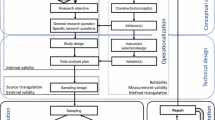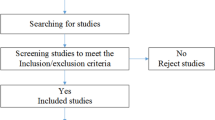Abstract
Science teachers are expected to teach in innovative ways that are different from their long experience as students. Professional development programs are planned to help teachers’ development, yet, there is little knowledge of the long-term effects of professional development programs (PDPs), and especially on actual practice. The purpose of this study is to gain a long-term perspective of the ways in which the process and outcomes of a reform-oriented, extended PDP are expressed in science teachers’ practice. Data sources included interviews and documents. The study presents four case studies of the practices of junior high school science teachers (grades 7–9) in Israel, with respect to a past PDP in which they took part a decade ago. The cases are presented in pairs of a leader and a follower. Each case details the teacher’s work context, sustained implementation, coherence of tools and approaches, and adaptations. All four teachers shared the view that scientific skills are important to their students as learners in a changing world. All four teachers adopted one or two major approaches, which were the PDP’s main focus. In addition, the two leaders adopted two more approaches. The teachers were still using many strategies associated with the major foci of the PDP. The level of enactment and modifications of the strategies varied. Usability of innovations is discussed in relation to the teachers’ context. We suggest that science teachers’ professional development include the ability to adapt the innovation to their teaching context in order to sustain the changes for a long period of time.
Similar content being viewed by others
References
American Association for the Advancement of Science (AAAS). (1993). Benchmarks for science literacy: project 2061. New York: Oxford University.
Bell, B., & Gilbert, J. (1996). Teacher development: a model from science education. London: Falmer.
Bertram, A., & Loughran, J. (2012). Science teachers’ views on CoRes and PaP-eRs as a framework for articulating and developing pedagogical content knowledge. Research in Science Education, 42(6), 1027–1047.
Blanchard, M. R., Southerland, S. A., Osborne, J. W., Sampson, V. D., Annetta, L. A., & Granger, E. M. (2010). Is inquiry possible in light of accountability? A quantitative comparison of the relative effectiveness of guided inquiry and verification laboratory instruction. Science Education, 94(4), 577–616.
Blumenfeld, P., Fishman, B. J., Krajcik, J., Marx, R. W., & Soloway, E. (2000). Creating usable innovations in systemic reform: scaling up technology-embedded project-based science in urban schools. Educational Psychologist, 35(3), 149–164.
Briscoe, C., & Peters, J. (1997). Teacher collaboration across and within schools: supporting individual change in elementary science teaching. Science Education, 81(1), 51–65.
Clarke, D. J., & Hollingsworth, H. (2002). Elaborating a model of teacher professional growth. Teaching and Teacher Education, 18(8), 947–967.
Darling-Hammond, L. (2000). Teacher quality and student achievement: A review of state policy evidence. Educational Policy Analysis Archives, 8(1). Retrieved from http://epaa.asu.edu/epaa/v8n.
Darling-Hammond, L., & Richardson, N. (2009). Research review/teacher learning: what matters. Educational Leadership, 66(5), 46–53.
De Bono, E. (1983). The direct teaching of thinking as a skill. Phi Delta Kappan, 64, 703–708.
De Bono, E. (1985). The CoRT thinking program. Developing minds: a resource book for teaching thinking, 203-209
Desimone, L. M. (2009). Improving impact studies of teachers’ professional development: toward better conceptualizations and measures. Educational Researcher, 38(3), 181–199.
Desimone, L. M., Porter, A. C., Garet, M. S., Yoon, K. S., & Birman, B. F. (2002). Effects of professional development on teachers’ instruction: results from a three-year longitudinal study. Educational Evaluation and Policy Analysis, 24(2), 81–112.
Dori, Y., & Herscovitz, O. (2005). Case-based long-term professional development of science teachers. International Journal of Science Education, 27(12), 1413–1446.
Dori, Y. J., Tal, T., & Peled, Y. (2002). Characteristics of science teachers who incorporate web-based teaching. Research in Science Education, 32(511–547).
Eylon, B.-S., & Bagno, E. (2006). Research-design model for professional development of teachers: Designing lessons with physics education research. Physical Review Special Topics-Physics Education Research, 2(2), 020106. Retrieved from http://journals.aps.org/prper/pdf/10.1103/PhysRevSTPER.2.020106. August 2016.
Feiman-Nemser, S. (2001). Helping novices learn to teach: lessons from an exemplary support teacher. Journal of Teacher Education, 52(1), 17–30.
Fishman, B., & Krajcik, J. S. (2003). What does it mean to create sustainable science curriculum innovations? Science Education, 87(4), 564–573.
Fishman, B., Marx, R., Best, S., & Tal, R. (2003). Linking teacher and student learning to improve professional development in systemic reform. Teaching and Teacher Education, 19(6), 643–658.
Garet, M., Porter, A., Desimone, L., Birman, B., & Yoon, K. (2001). What makes professional development effective? Analysis of a national sample of teachers. American Education Research Journal, 38(4), 915–945.
Hemsley-Brown, J., & Sharp, C. (2003). The use of research to improve professional practice: a systematic review of the literature. Oxford Review of Education, 29(4), 449–471. doi:10.1080/0305498032000153025.
Herman, B. C., Clough, M. P., & Olson, J. K. (2013). Teachers’ nature of science implementation practices 2–5 years after having completed an intensive science education program. Science Education, 97(2), 271–309. doi:10.1002/sce.21048.
Hewson, P. W. (2007). Teacher professional development in science. In S. K. Abell & N. G. Lederman (Eds.), Handbook of research on science education (pp. 1179–1203). N.J.: Lawrence Erlbaum Associates.
Johnson, C. C. (2007). Whole-school collaborative sustained professional development and science teacher change: signs of progress. Journal of Science Teacher Education, 18(4), 629–661.
Kennedy, M. M. (2002). Knowledge and teaching. Teachers and Teaching: Theory and Practice, 8(3/4), 355–370.
Lotter, C., Harwood, W. S., & Bonner, J. J. (2007). The influence of core teaching conceptions on teachers’ use of inquiry teaching practices. Journal of Research in Science Teaching, 44, 1318–1347. doi:10.1002/tea.20191.
Loucks-Horsley, S., Love, N., Stiles, K. E., Mundry, S., & Hewson, P. W. (2003). Designing professional development for teachers of science and mathematics. Thousand Oaks: Corwin.
Luft, J. A., Firestone, J. B., Wong, S. S., Ortega, I., Adams, K., & Bang, E. (2011). Beginning secondary science teacher induction: a two-year mixed methods study. Journal of Research in Science Teaching, 48(10), 1199–1224.
Luft, J. A., & Hewson, P. W. (2014). Research on teacher professional development programs in science. In N. G. Lederman & S. K. Abell (Eds.), Handbook of research on science education (Vol. 2, pp. 889–909). NY: Routledge.
Mesci, G., & Schwartz, R. S. (2016). Changing preservice science teachers’ views of nature of science: why some conceptions may be more easily altered than others. Research in Science Education, 1-23, doi: 10.1007/s11165-015-9503-9.
Miles, M. B., & Huberman, A. M. (1994). Qualitative data analysis: an expanded sourcebook. Thousand Oaks: Sage.
Miranda, R. J., & Damico, J. B. (2013). Science teachers’ beliefs about the influence of their summer research experiences on their pedagogical practices. Journal of Science Teacher Education, 24(8), 1241–1261.
National Committee on Science Education Standards and Assessment. (1996). National science education standards: 1996. Washington, DC: National Academy.
National Research Council (NRC). (2000). National Science Education Standards. Washington, DC: National Academy.
NGSS Lead States. (2013). Next generation science standards: for states, by states. Washington: National Academies.
NRC. (1996). National science education standards. Washington: National Research Council.
NRC. (2012). A framework for K-12 science education: practices, crosscutting concepts, and core ideas. Washington DC: National Academies.
Opfer, V. D., & Pedder, D. (2011). Conceptualizing teacher professional learning. Review of Educational Research, 81(3), 376–407.
Patton, M. Q. (2002). Qualitative research & evaluation methods (3rd ed.). Thousand Oaks: Sage.
Pedder, D., & Opfer, V. D. (2013). Professional learning orientations: patterns of dissonance and alignment between teachers’ values and practices. Research Papers in Education, 28(5), 539–570.
Penuel, W. R., Fishman, B. J., Yamaguchi, R., & Gallagher, L. P. (2007). What makes professional development effective? Strategies that foster curriculum implementation. American Educational Research Journal, 44(4), 921–958.
Roehrig, G. H., Kruse, R. A., & Kern, A. (2007). Teacher and school characteristics and their influence on curriculum implementation. Journal of Research in Science Teaching, 44(7), 883–907.
Schneider, R. M., Krajcik, J., & Blumenfeld, P. (2005). Enacting reform-based science materials: the range of teacher enactments in reform classrooms. Journal of Research in Science Teaching, 42(3), 283–312.
Smith, K., & Lindsay, S. (2016). Building future directions for teacher learning in science education. Research in Science Education, 1-19, doi: 10.1007/s11165-015-9510-x.
Southerland, S. A., Sowell, S., Blanchard, M., & Granger, E. (2011). Exploring the construct of pedagogical discontentment: a tool to understand science teachers’ openness to reform. Research in Science Education, 41(3), 299–317.
Stake, R. E. (2006). Multiple case study analysis. New York: Guilford.
Strauss, A., & Corbin, J. (1994). Grounded theory methodology: an overview. In N. K. Denzin & Y. S. Lincoln (Eds.), Handbook of qualitative research (pp. 273–285). Thousand Oaks: Sage.
Swartz, R. J., & Parks, S. (1994). Infusing the teaching of critical and creative thinking into content instruction: a lesson design handbook for the elementary grades. Pacific Grove: Critical Thinking.
Taitelbaum, D., Mamlok-Naaman, R., Carmeli, M., & Hofstein, A. (2008). Evidence for teachers’ change while participating in a continuous professional development programme and implementing the inquiry approach in the chemistry laboratory. International Journal of Science Education, 30(5), 593–617.
Tal, R. T., & Argaman, S. (2005). Characteristics and difficulties of teachers who mentor environmental inquiry projects. Research in Science Education, 35, 363–394.
Tal, T., Krajcik, J. S., & Blumenfeld, P. C. (2006). Urban schools' teachers enacting project-based science. Journal of Research in Science Teaching, 43(7), 722–745.
Tsui, A. (2003). Understanding expertise in teaching: case studies of second language teachers: Ernst Klett Sprachen.
Wilson, S. M., & Berne, J. (1999). Teacher learning and the acquisition of professional knowledge: an examination of research on contemporary professional development. In A. Iran-Nejad & P. D. Pearson (Eds.), Review of research in education (pp. 173–209). Washington: American Educational Research Association.
Woodbury, S., & Gess-Newsome, J. (2002). Overcoming the paradox of change without difference: a model of change in the arena of fundamental school reform. Educational Policy, 16(5), 763–782.
Acknowledgments
This study was supported by a Ph.D. fellowship from Technion, Israel. The authors thank all the teachers who shared their professional development stories.
Author information
Authors and Affiliations
Corresponding author
Appendix 1
Appendix 1
Rights and permissions
About this article
Cite this article
Furman Shaharabani, Y., Tal, T. Teachers’ Practice a Decade After an Extensive Professional Development Program in Science Education. Res Sci Educ 47, 1031–1053 (2017). https://doi.org/10.1007/s11165-016-9539-5
Published:
Issue Date:
DOI: https://doi.org/10.1007/s11165-016-9539-5




